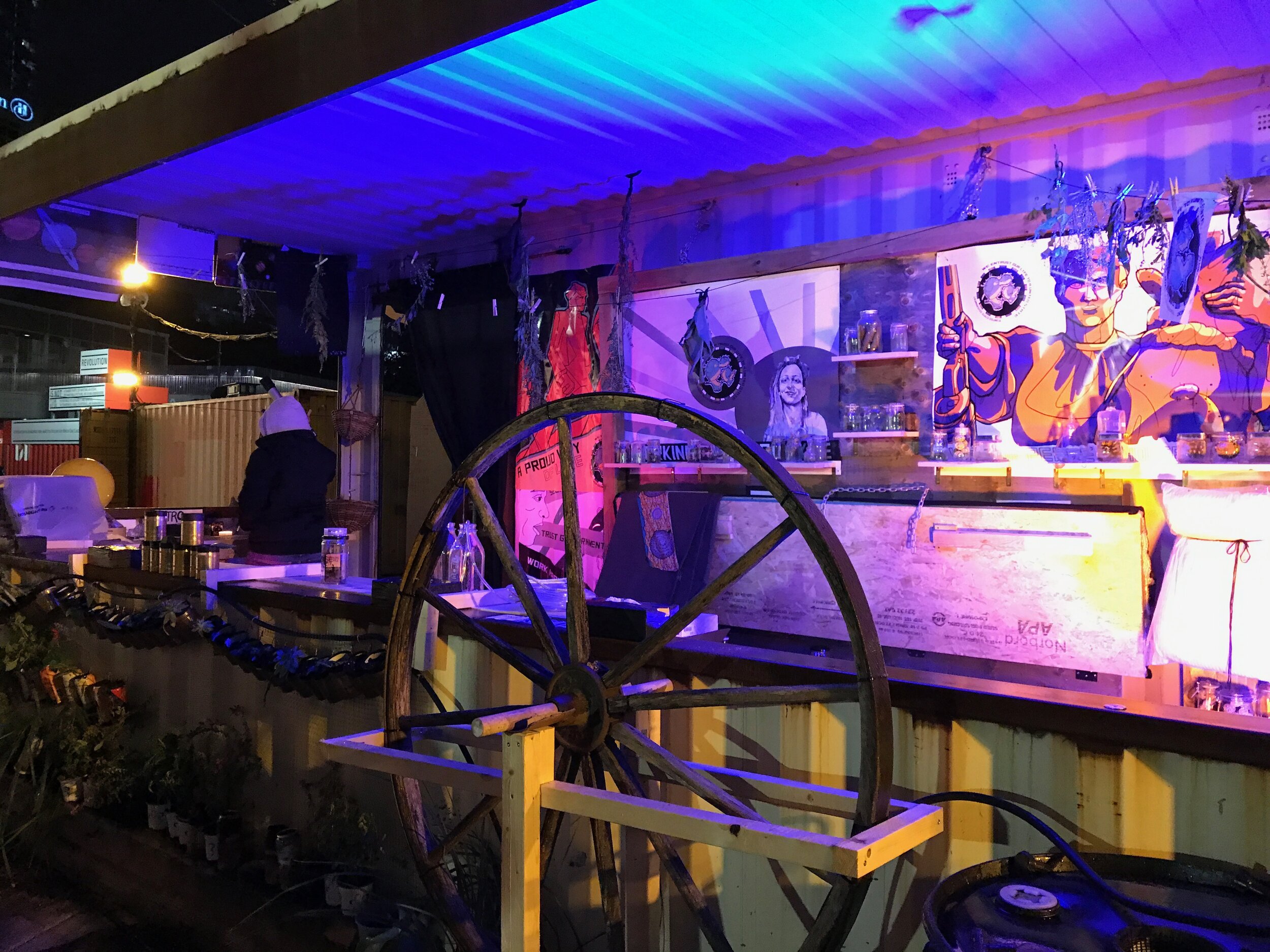
Nuit Blanche 2017:
The Stolen People &
Won’t Back Down
The Stolen People
Co-curated by Syrus Marcus Ware & Melisse Watson
This government issued workstation is one of many that occupy the futures decimated landscape. Covered with socialist-style pro-government propaganda and non-rebel iconography, at first glance seems a mechanical open air purgatory of a lost place. People clock in for their shifts and work tirelessly during the days to filter water, grow food hydroponically, attempt to make communication with “the others” and take their daily dose of life, a serum that protects citizens from the high levels of pollutants in the air and water.
At night the space is converted into an activist meeting place by The Stolen People, rebels who are resisting the system and have created a life-giving serum of their own. As such, the rebels live outside of the system. Letters, objects, memorabilia and archives are all left from their movement. The Stolen People leave these messages to communicate with loved ones, to learn of times before, to keep up with current organizing plans and strategies. The Stolen People are part of a vast underground movement that came out of the Black Power Movement, Black Lives Matter Movement and the Last Stand era, which ended abruptly in 2067 when the water became too polluted to consume. They are Black people—people who would not be eradicated.
Syrus Marcus Ware & Melisse Watson have collaborated on large scale durational performances for FADO’s performance series, Monomyths (Toronto, 2016) and for The Theatre Centre in Toronto. Their projects invoke the spirit of collaborative work, collective struggle, and make visible the invisibilized labour of women & trans people within activist movements. They have explored futurism, black mysticism and draw on their solo practices which explore black radical tradition, black & Indigenous solidarity & nature-inspired practices for social change.
Won’t Back Down
Curated by Deanna Bowen
An exuberant gathering atop a flatbed truck evokes a moment in Toronto’s history. Members of the Black Lives Matter movement came together in a march from Toronto Police Headquarters and Native Child and Family Services to Queen’s Park to play music to a roused community of activists and artists.
The all-night festive performance (loosely based on the events of March 26, 2016) saw artist and activist DJ Syrus Ware gathering an indomitable crew of DJs to rotate their sets of infectious sounds. Invited by Deanna Bowen, he joined forces with other artists and activists whose work revolved around colonial histories—including the impact on Indigenous peoples’ lives. Their presence was underscored by Kaia’tanoron Dumouli who led the OCADU Indigenous Visual Culture group t-shirt campaign.
Rooted in Deanna Bowen’s own family’s history—going all the way back to Nicodemus, Kansas, 1877—the event reconnected lost, buried or forgotten histories around race, blackness and anti-blackness, ongoing legacies of slavery, and generational trauma. It acknowledged solidarity between Black and Indigenous elders and activists, recalling generations of resistance, cohabitation, shared/learned languages, shared bloodlines, and shared battles across time.
Featuring Syrus Marcus Ware, Kaia’tanoron Dumoulin Bush, and Tannis Nielsen
PRESS
Brait, Ellen. “Nuit Blanche 2017 will serve up issues with the art”. The Toronto Star. Aug 28, 2017.
Levine, Romi. “Nuit Blanche Toronto comes to U of T, Queen's Park for exhibition by Art Museum curator”. UofT News. Sept 19, 2017.
White, Murray. “Art meets activism at Nuit Blanche 2017”. The Toronto Star. Sept 28, 2017.
Schechter, Fran. “10 must-see shows at Nuit Blanche 2017”. NOW Magazine. Sept 26, 2017.
Maricic, Dragan. “Nuit Blanche brings politics to the people”. Sheridan Sun. Oct 4, 2017.
Photos courtesy of the artist.




















